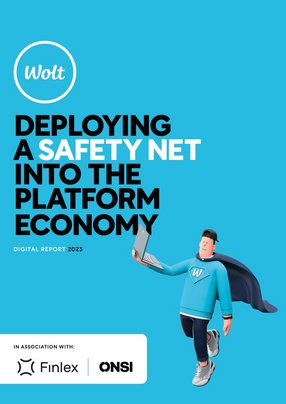Wolt: deploying a safety net into the platform economy
Anybody who lived on planet Earth during the COVID-19 pandemic will be very familiar with the convenience and variety that comes from having food, groceries and merchandise delivered to your door. In the US, companies like DoorDash, Grubhub and UberEats are helping to create a roughly US$25bn economy – buoyed by strong growth during lockdown.
One of Europe’s leading players in the industry is Wolt, a Finnish-headquartered technology company that makes it easy to discover and get the best restaurants, grocery stores and other local shops delivered to your home or office.
Founded in 2014, Wolt has rapidly grown to a 9,000-person company spread across 25 countries and hundreds of cities – from Oslo to Tokyo. Wolt has also expanded from restaurants to multiple verticals, and customers can today order a broad selection of products on Wolt – from medicines to dog food and flowers to cosmetics. In 2022, Wolt joined forces with DoorDash, which operates in 29 countries today, including 25 of them with the Wolt product and brand.
What are the needs of a courier partner?
Understanding the demands of courier partners is the first step towards providing a relevant insurance proposition for them – a process which is led by Wolt’s Head of Insurance and Risk, Garrett Olson.
Based in the Danish capital, Copenhagen, Olson has been with Wolt for just over three years. Building simple, relevant and valuable safety nets for the platform economy motivates him. Prior to Wolt, he worked with the Executive Boards at Zurich Insurance Group; the shipping company Mærsk; and FLSmidth, an OEM to the mining and cement industry in strategy, risk and venture building roles.
There is no typical Wolt courier partner. Olson understands each courier partner has their own personality, preference of vehicle and device, and desired hours on the platform. He recognises the various motivations that individuals may have for earning on the platform: sporadic and ad-hoc basis, supplementary or transitional.
Each courier partner has different motivations, and it highlights the importance of one’s flexibility to work around their own situation and schedule. Insurance propositions should be designed for people working flexibly.
“Wolt offers courier partners with insurance during the time they are logged online, making deliveries with Wolt,” Olson says. “When offering this insurance, we have focused our attention on not only the accident, but also the recovery period. We want a healthy, happy courier partner to return to the platform. This safety net enables courier partners to make deliveries with a peace of mind. How you manage this risk is one of the most essential building blocks I’ve seen to generate sustainable value, while strengthening reputation.”
Wolt’s insurance proposition for couriers
With over 180,000 active courier partners fulfilling millions of orders every year, accidents are bound to happen – and they do. That’s where Wolt’s insurance proposition comes in. Having a very diverse group of people as courier partners across 25 countries underlines the challenge of creating an insurance proposition that would work for everyone.
Wolt’s courier partners want flexibility. They want to be able to log on the platform when it suits them, work for as little or as long as they choose, and know that there’s always going to be enough orders on the platform to earn money. This extends to the insurance piece, too; courier partners want to know they’re adequately covered against accidents or injuries that happen in the course of their work by insurance that is able to respond quickly to the severity of the incident.
Should they need to make a claim, they expect it to be as simple, intuitive and easy to follow as ordering on the Wolt app. As with the customer app, Wolt pays close attention to the hierarchy of information, presenting key details in concise formats which also applies to the partner insurance dashboard – accentuated with graphics, icons and short descriptions wherever appropriate – to make the claim submission process as effortless as possible for courier partners who have had a fall, collision or breakage.
Wolt offers two types of insurance coverage to the courier partners. The first is accident cover that includes “the broad spectrum of risks that couriers face”, Olson tells us – including dislocations, broken bones, and chipped teeth. Although Denmark is one of the world’s most bike-friendly nations, minor injuries like this are not uncommon. But the company also insures the most extreme and unfortunate end of the spectrum as well, from disability all the way up to death.
“We’ve built some unique aspects into our programme, specifically because we’ve listened to courier partners, assessed municipal data and pushed the insurance industry to adapt,” Olson continues. This includes a death benefit paid out to a dependent of a courier partner, as well as protection against assault.
The second programme revolves around third-party liability for courier partners. The benefits of this are two-fold, Olson says: first it is aligned with Wolt’s commitment to make the cities they’re in better places, as the insurance protects against unfortunate incidents courier partners may have caused. Second, it also fills an unmet gap in the insurance market.
“It’s virtually impossible for an individual courier partner to go and get that type of coverage elsewhere,” he says, “particularly if their mode of transportation is an e-vehicle, a bike, or just delivering on foot.” In most Wolt countries the only component of insurance that courier partners are responsible for themselves is the mandatory motor insurance – understandable given that riders and drivers use their own vehicles. But incidents that occur after they set foot outside that vehicle, and attempt to deliver the order to the customer, is covered through Wolt.
Creating a consistent experience is ‘a challenge’
Being present in 25 different markets, one of the biggest challenges Wolt faces from an insurance perspective is, perhaps surprisingly, not complying with multiple jurisdictions – rather, it’s controlling the claim process. Courier partners want to be compensated promptly so it’s important that, when a claim is submitted in the local language, the third-party administrator or insurance carrier is responsive and handles the claim transparently and efficiently.
“Courier partners expect compensation in hours – a big shift from the norm of weeks or months. We are down to a few days, but strive to get this down to minutes.”
There are over 30 different languages used natively across the Wolt ecosystem, so it is imperative to have claims handled in the local language for the courier, third party and insurer. It builds confidence with the impacted person to navigate the process in their native tongue.
As the company continues to scale, paying claims quickly and ensuring that couriers continue to receive a positive experience remains a challenge. Consistency is the end-goal, Olson says: “When we expanded our programme into more remote markets from the Nordics, to Kazakhstan and Azerbaijan, we ran into some new challenges. These are not easy markets to operate in because of how insurance is – or isn’t – regulated, how the very concept of insurance is defined, plus how the premium is calculated.”
“When you’re going to the local insurance companies and asking them to build a bespoke proposition for a disruptive business model, even if it’s reinsured outside the country, that’s where the challenges emerge – from building a new offering to processing the claims very quickly. If we fail, it tends to still be forward. We view obstacles as opportunities. We are addressing a new segment, so inherently the status quo will push back.”
Assessing risk more dynamically
The future of Wolt’s insurance proposition lies in dynamically assessing the risk that courier partners face in real time. Presently, risk is determined by how many hours courier partners are online – even if they’re just waiting for their next order. “The data we can’t see will eventually hurt us.” Instead, Wolt intends to use local dynamic data in a much more granular way to provide a more insightful snapshot of real-time risk exposures – to have relevant limits at a city or even courier level while also lowering the cost of premiums in the process.
“Drawing on that dynamic component allows the insurance companies to really understand risk factors better,” Olson tells us. Those risk factors could include the weather; riders are more likely to slip or trip when it’s icy, or use a car when it rains.
There are also variations between cities – some, like Copenhagen, feature segregated bike lanes, while others, like Prague, have a lot of narrow and cobblestoned streets. Other cities feature vast and expansive boulevards. Between cities, delivery vehicles also vary; there are said to be five times as many bicycles as people in the Danish capital, but they are less popular in car-heavy Baku – the capital of Azerbaijan.
Finally, exposure to risk will be influenced even by the smallest consideration like who exactly the courier is. Experienced, full-time courier partners are – in theory, at least – less likely to experience a serious crash than those who dip in and out of the app on a regular basis, perhaps going weeks or months at a time without fulfilling orders while they work other jobs or study.
“Those are the things that would be captured if we used dynamic risk data. The brush stroke risk exposure and pricing in reality does not represent the entire spectrum of the risk which leads to over-insuring or under-compensating.”
Who is Wolt’s Head of Insurance Garrett Olson?
Despite being based in Copenhagen and having an inconspicuous surname, Garrett Olson is not actually Danish by birth. He was raised in Minnesota and spent time studying in Arizona before embarking on a career outside the United States. In fact, Olson comes from a long line of Petersens, Eriksens and Olsons – Danes and Swedes, meaning the Nordic connection has come full circle.
After emigrating almost 20 years ago, Olson has lived and worked in Mexico, the Czech Republic, the UK, Switzerland, Brazil and, since 2016, Denmark – which he now calls hjem. But he has always been imbued with a sense of ‘wanderlust’ – or vandrelyst, if you insist.
“As a kid, my parents would take me hiking in Yosemite and we would travel all over the US,” Olson says from his home office. “I think I was months old when I went on my first trip. I think by the time I was five I had been to Hawaii and Canada a handful of times. We travelled a lot.”
That adventurous curiosity continued into Olson’s adult life. Often moving around for work, he claims to enjoy nothing more than the pure confusion that comes from experiencing a new culture inside and outside the office. “I’m comfortable being uncomfortable. The sights, the smells, the food and the feeling of being stranded in a Japanese train station and not knowing what you’re going to do,” he jokes. “Finding your new dentist and barber shop, opening up a bank account and even figuring out the best watering hole to catch a football match is part of the routine of being an expat. ”
But Olson is settled now – both at Wolt, and in his adopted homeland of Denmark. When he and his wife order takeout for the evening (using Wolt, of course), they usually plump for Thai cuisine or sushi. But left alone, he will always take a trip straight back to his roots. “Whenever I have a chance, I order fried chicken sandwiches,” he says. “I think so far I’ve found two places in Copenhagen that come close to the ones back at home.”
- FinTech LIVE Singapore - Become a SpeakerDigital Payments
- Global FinTech Awards 2025 - SUBMISSIONS OPENFinancial Services (FinServ)
- FinTech LIVE London – Steve Bowers on Safeguarding FintechsRegTech & Compliance
- Forrester: Banks Face Twin Challenges on Profits and CXFinancial Services (FinServ)



